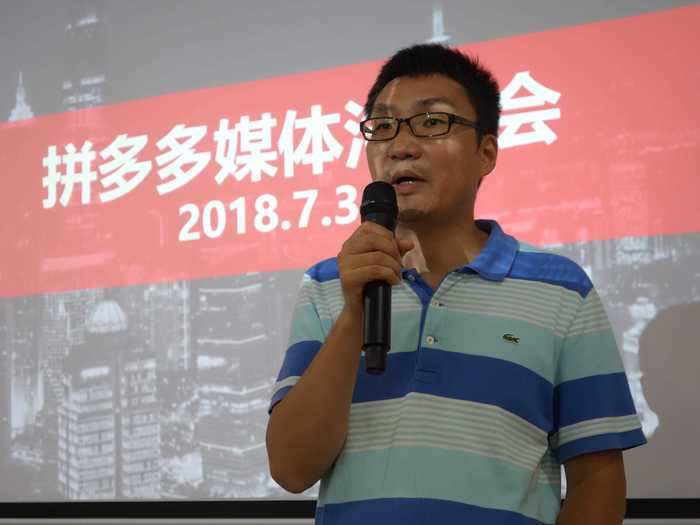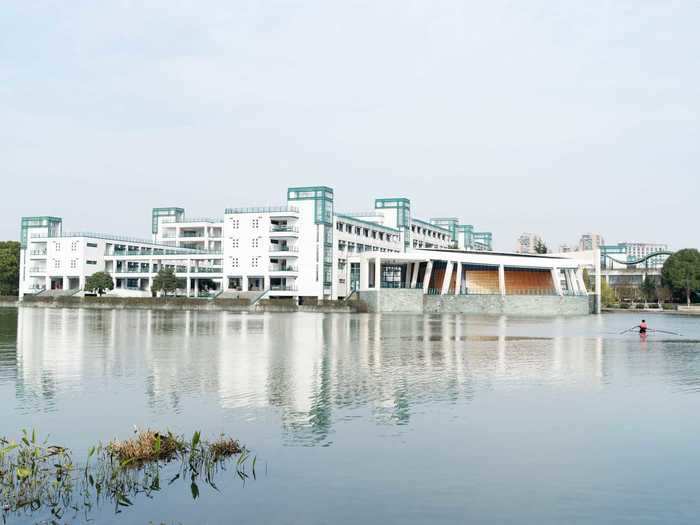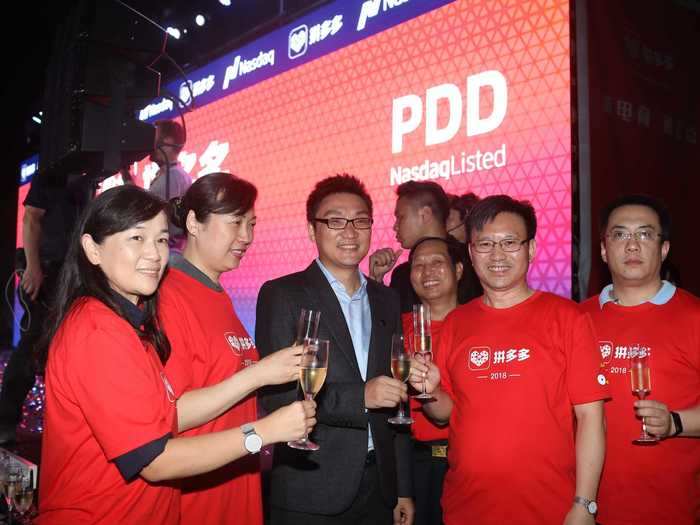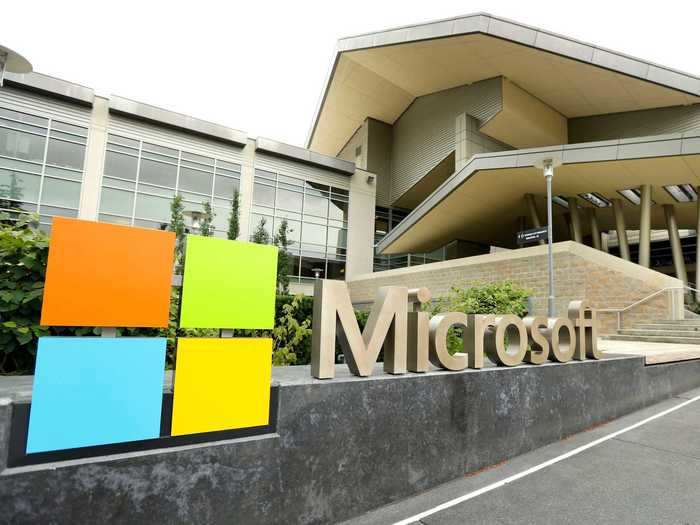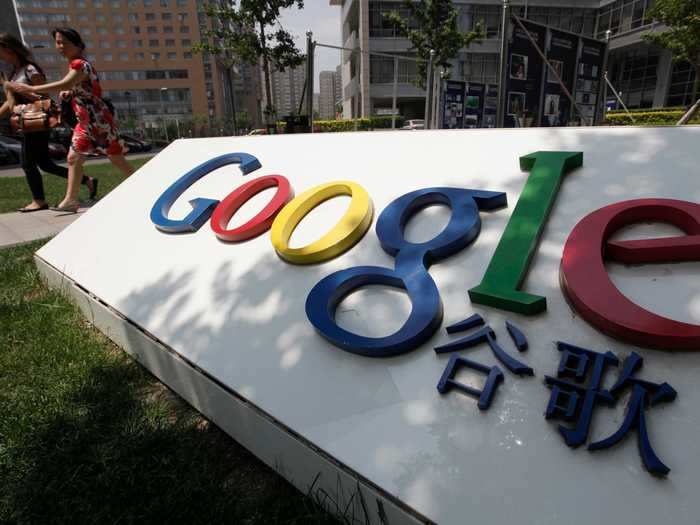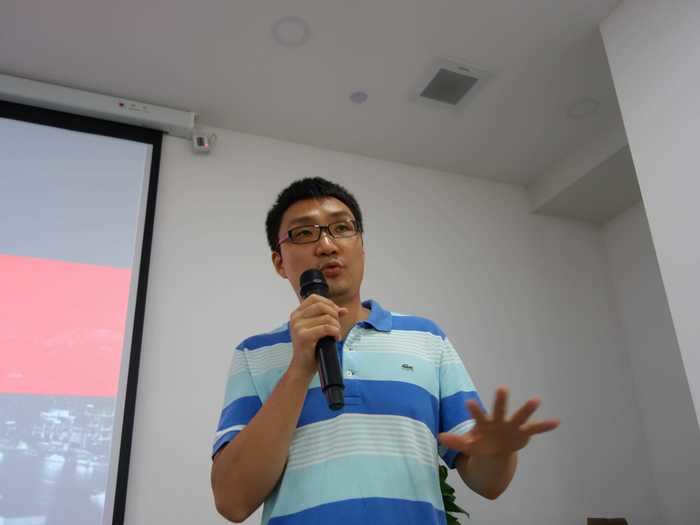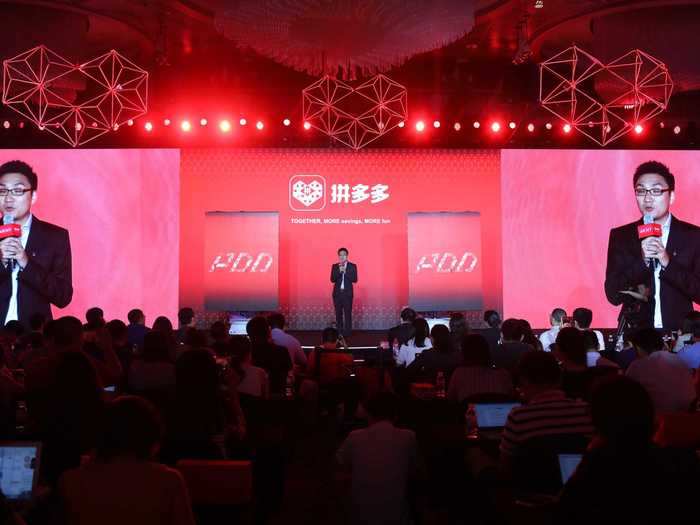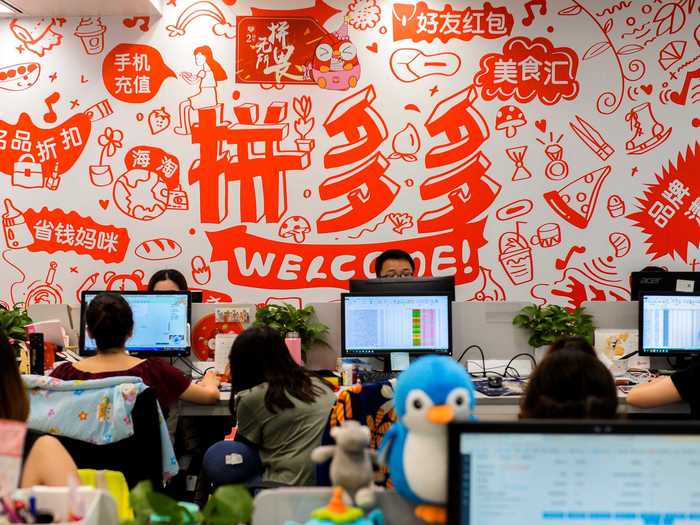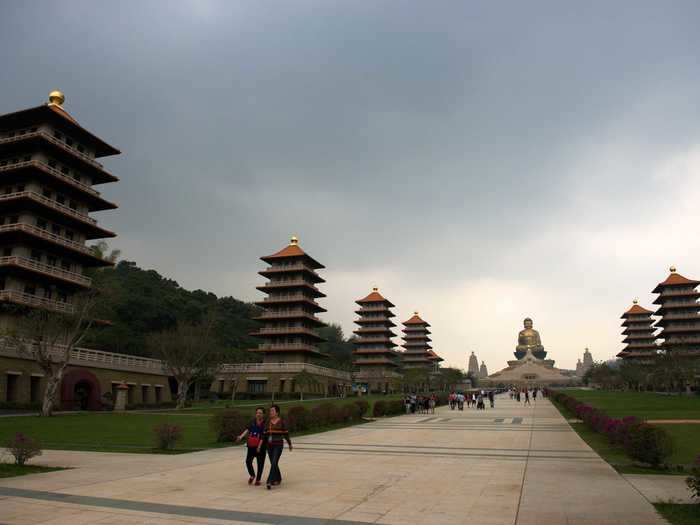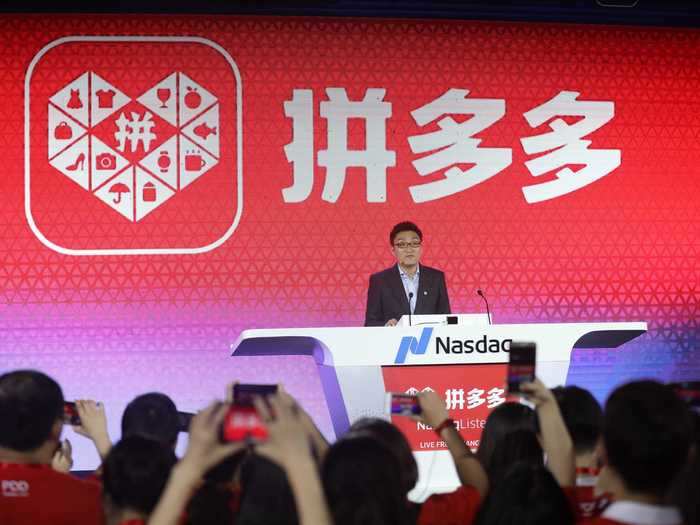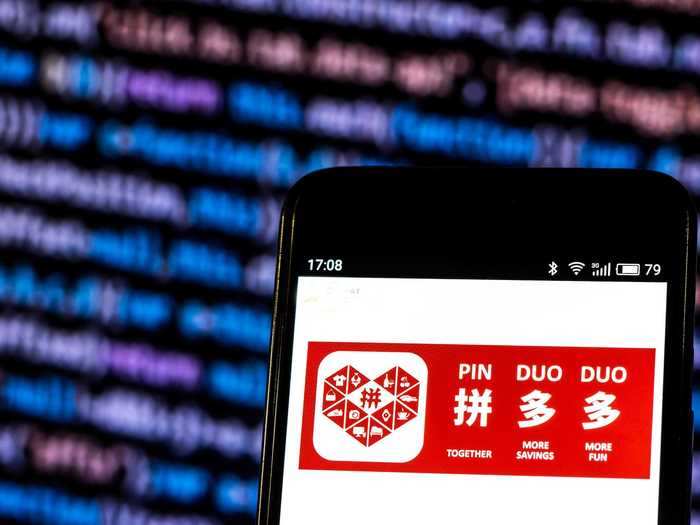Colin Huang, Pinduoduo founder.Visual China Group/Getty Images
- Colin Huang, the 40-year-old founder of ecommerce giant Pinduoduo, is currently China's third-richest person.
- Huang on July 1 stepped down as chief executive of Pinduoduo, which has managed to rack up a market cap of more than $100 billion in less than five years.
- Pinduoduo is a gamified online marketplace that connects buyers and sellers and has a market value of $101 billion — more than Uber or Sony. Huang, who owns 29.4% of the company, is currently worth more than $40 billion.
- Huang's first full-time job was at Google. He resigned in 2007, and has since been a serial entrepreneur.
Colin Huang isn't a household name outside of China, but he's a serious challenger to Alibaba founder Jack Ma and Tencent founder and CEO Pony Ma for the title of China's richest man.
Huang has just stepped down as the chief executive of Pinduoduo, a gamified online marketplace connecting buyers and sellers. It's popular in China and has a market cap of more than $100 billion, giving it a higher valuation than Uber or Sony.
People buy items on Pinduoduo such as iPhones at sale price while playing games, and rope in friends to "group-buy" groceries at huge discounts. Pinduoduo takes a small commission and charges sellers to promote their products on its app, but doesn't hold any stock.
Huang, 40, founded the company in 2015. It's grown rapidly ever since, and listed in July 2018.
Huang's fortune has exploded since. His net worth is up by $25 billion in 2020, and shares in Pinduoduo climbed to an all-time high of $87.58 on the Nasdaq on June 19.
On June 21, Forbes' Real-Time Billionaire Index showed Huang, worth $45.4 billion, briefly surpassing Alibaba's Jack Ma, worth $43.9 billion, to become China's second-richest man after Tencent's Pony Ma. Huang soon slipped back into third place and currently he is 23rd on the global Bloomberg Billionaires Index.
Keep reading to learn more about the life of Pinduoduo billionaire Colin Huang.
Huang came from humble beginnings, and a math Olympiad changed his life
Pinduoduo founder Colin Huang.
Visual China Group/Getty Images
Huang was born in 1980 to factory worker parents on the outskirts of Hangzhou, a city in China's eastern province of Zhejiang. It's also where Alibaba is based.
Huang has detailed some aspects of his life in a now-suspended Medium blog.
In one post, he wrote that he went to an "ordinary" elementary school, but after he won a prize in a math Olympiad his teacher asked him to take an admission test for the highly selective Hangzhou Foreign Language School (HFLS).
He gained a place, but initially didn't want to go as he thought the school focused on foreign languages. "I wanted to go to a school strong in Math, Physics and Chemistry," wrote Huang.
"Later our principal called me over and convinced me to go. In retrospect, [thank] goodness that I chose to go to HFLS."
His secondary school was renowned for its liberal approach. "We were exposed to the western culture and influence much earlier, deeper and to a greater extent. A lot of us are more liberal than our peers in other schools," Huang said.
In the late 1990s, Huang was one of relatively few young Chinese people with internet access and international friends
Zhejiang University, where Huang studied computer science.
dowell/Getty Images
At 18, Huang started studying computer science at the prestigious Zhejiang University. In his freshman year, he was selected as a fellow at the Melton Foundation, established by VeriFone founder Bill Melton.
The foundation selected young students from emerging regions around the globe. Each fellow was given a computer and internet data so they could browse the web and message other fellows. They could also travel to a member country each year. Huang credits this experience for giving him a more international mindset than most people in China.
But Huang has one big regret about his youth
Colin Huang, pictured at Pinduoduo's Nasdaq listing party in 2018.
Visual China Group/Getty Images
Although Huang feels "very lucky" about how he was educated and the opportunities he enjoyed, describing himself as a "phoenix soaring out of a chicken coop", he has one major regret.
"I was too goal-oriented and wasted too much time striving to be number one in class and a good student," wrote Huang. He added that he wished he'd spent more time being rebellious, naughty, and "purely enjoying youth."
He interned at Microsoft, but wasn't tempted by a future at the Redmond giant
Huang interned at Microsoft's Redmond, Washington, base.
Ted S. Warren/AP
Huang received his first salary as a Microsoft intern and did stints at Microsoft Beijing and the Redmond, Washington office (Huang noted that he was paid far more in the Redmond office).
But he didn't choose to stay after his graduation. A mentor, who Huang did not name when describing the event in a blog post, told him to look at a company called Google. If he joined Google, the mentor said, he should stay at least three years because one or two was not enough to rise to an important position.
Huang's first full-time job was at Google, which he described as a lucky break
Huang was part of Google's Beijing landing team.
Reuters
Huang graduated with a master's degree in computer science from the University of Wisconsin, Madison in 2004, and landed his first full-time job at Google. He was a software engineer then product manager. At the time, Google was preparing to enter China, and Huang became part of the firm's landing team. He heeded his mentor's advice and stayed for three years.
Google floated on August 19, 2004, raising over $1.9 billion. Huang had joined just six months earlier. He recalls this heady time. "The operating profits and the number of [employees] grew rapidly," he said. His bank balance "suddenly grew a lot too."
Huang didn't realise how lucky he was at Google until he left. "It was not until three or four years after I left Google, I started to realize how rare it was to come across and join a company like Google at the time. It was a once-in-a-lifetime opportunity (or at least once in ten or twenty years) and I was extremely lucky."
Huang compares Google's local influence to China's liberalizing 1980s reforms
Colin Huang, Pinduoduo founder, in 2018.
Visual China Group/Getty Images
At Google, Huang saw how challenging it was for foreign tech companies to compete with local Chinese businesses.
Huang notes that despite Google's big-brand name, it struggled to recruitment China's top talents. "Contrary to what it seems, forming a team with strong fighting power is actually much more difficult for international companies than for local Chinese companies," he wrote in one post.
But he singled out Google's management for praise, comparing their impact to China's "reform and opening-up" era of economic liberalization in the 1980s. Google was "encouraging grassroots innovation, daring to try, highly concentrated in central power and enjoying the institutional advantage of focusing resources on a few big things."
Huang gained "basic financial freedom" at Google — then went his own way
Colin Huang speaking in 2018.
Visual China Group/Getty Images
After resigning from Google in 2007, Huang started ecommerce site Oukou, which sold consumer electronics and home appliances. He sold the venture three years later in 2010, before starting his second company, Leqi, which helped foreign brands market their online stores on Chinese ecommerce platforms such as Tmall and JD.com.
His third venture was gaming studio Xunmeng, which created web-based role-playing games, often featuring scantily clad female characters.
The ecommerce space was dominated by Alibaba and JD.com when Huang launched Pinduoduo in 2015. But having gained experience in both ecommerce and games, the serial entrepreneur believed he could find success by gamifying online shopping.
Huang wants Pinduoduo to be a mash-up of Costco and Disneyland
Pinduoduo's Shanghai base.
Reuters
Drawing on his experience in games, Huang has turned Pinduoduo into a "gamified" shopping app. Buyers can water a virtual mango tree while they shop — if the tree is tended enough days in a row, users are sent a free box of mangoes. This encourages daily visits to the app. As Huang wrote in the company's IPO prospectus, Pinduoduo is like a combination of Costco and Disneyland.
As well as subsidies on orders, Pinduoduo offers users cash rewards for playing a game that involves bringing others to the platform. His approach has drawn masses of buyers, and, in turn, sellers, who pay for advertising, which is key to the company's business model and generates more revenue than sales.
Analysts worry that Pinduoduo cannot sustain its growth and move beyond low-priced, low-quality goods. The company has done well in China's lower-tier cities, which often have many millions of people, but in major cities like Shanghai and Beijing, Pinduoduo struggles against rivals JD and Alibaba.
The billionaire has been influenced by Buddhism, and once travelled to Taiwan to visit a famous Buddhist pilgrimage site
Huang has visited Fo Guang Shan monastery, in Taiwan, and takes inspiration from Buddhism.
Jeremy Horner/Getty Images
As a child, Huang would go with his grandfather to worship Buddha, burning offerings of paper ingots and leaving food. In middle school, he learned that Buddhism is "neither the wind moving nor the flag moving", but that it is "our heart moving," he wrote in a blog post. When he was an adult, Huang visited the Fo Guang Shan monastery in Taiwan, a famous pilgrimage site for devotees of Master Hsing Yun, a Buddhist monk and founder of the Fo Guang Shan religious movement.
Huang says he is a non-Buddhist, but the religion has clearly left a mark. Referring to his Google days, he noted how money could change people overnight. "As Buddhism mentioned, how much money one can get is a corresponding virtuous reward. It's not necessarily a good thing to get a big fortune without enough virtue," he wrote on his blog.
He said some early Google staff had "too much money, lost incentives to work and started to look for fun and new careers." These people potentially wasted their most precious years, he wrote.
He didn't attend the Wall Street opening bell for his company's Nasdaq IPO
Colin Huang at Pinduoduo's listing party in Shanghai, 2018.
Visual China Group/Getty Images
Many entrepreneurs might fantasize about ringing the opening bell on Wall Street for their company's public trading debut, but Huang preferred to stay in China. Pinduoduo started trading on the Nasdaq on July 26, 2018, but the founder remained in Shanghai, for a simultaneous bell-ringing ceremony with investors and customers.
Speaking to Chinese media on the day, Huang said he wanted to let customers take part, "but it might have been a bit of a hassle to arrange visas for them all to travel to the US. Isn't it better that consumers, investors, all of us myself included, be here?" He tends to avoid long-haul travel to prevent a recurring ear infection, he added.
His company is perhaps the biggest in the world to have never made a quarterly profit
Pinduoduo's logo.
SOPA Images/Getty Images
Pinduoduo is now a household name in China and a true Alibaba rival — but it doesn't turn a profit. It regularly accrues huge losses, the result of lavish promotions to attract customers. For example, Apple iPhones and computers are often cheaper on Pinduoduo than in Apple stores. In May 2019, it famously spent RMB 10 billion ($1.4bn) on a marketing campaign that lowered the price on brand-name products, in an attempt to boost sales and retain customers. Alibaba soon launched a similar campaign.
Huang stepped down as chief executive on July 1, 2020
The Pinduoduo app
SOPA Images / Contributor / Getty Images
Huang stepped down as chief executive of Pinduoduo on July 1 and, according to the Financial Times, reduced his personal stake in the firm by around $14.3 billion. He still owns 29.4% of the company, according to an SEC filing.
Chen Lei, a founding employee and Pinduoduo's chief technology officer, has taken over the top job.
Huang will remain chairman, and will formulate a long-term strategy for his company.

